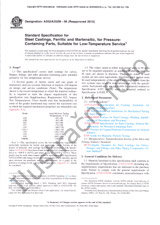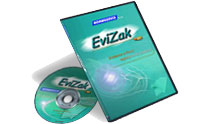Potřebujeme váš souhlas k využití jednotlivých dat, aby se vám mimo jiné mohly ukazovat informace týkající se vašich zájmů. Souhlas udělíte kliknutím na tlačítko „OK“.
ASTM D7153-22ae1
Standard Test Method for Freezing Point of Aviation Fuels (Automatic Laser Method) (Includes all amendments And changes 12/3/2025).
Přeložit název
NORMA vydána dne 1.10.2022
Informace o normě:
Označení normy: ASTM D7153-22ae1
Poznámka: NEPLATNÁ
Datum vydání normy: 1.10.2022
Kód zboží: NS-1097576
Počet stran: 10
Přibližná hmotnost: 30 g (0.07 liber)
Země: Americká technická norma
Kategorie: Technické normy ASTM
Kategorie - podobné normy:
Anotace textu normy ASTM D7153-22ae1 :
Keywords:
aviation turbine fuels, freezing point, wax crystals,, ICS Number Code 75.160.20 (Liquid fuels)
Doplňující informace
| Significance and Use | ||||||||
|
5.1?The freezing point of an aviation fuel is the lowest temperature at which the fuel remains free of solid hydrocarbon crystals which, if present in the fuel system of the aircraft, can restrict the flow of fuel through filters. The temperature of the fuel in the aircraft tank normally decreases during flight depending on aircraft speed, altitude, and flight duration. The freezing point of the fuel shall always be lower than the minimum operational fuel temperature. 5.2?Petroleum blending operations require precise measurement of the freezing point. 5.3?This test method expresses results to the nearest 0.1 ?C, and it eliminates most of the operator time and judgment required by Test Method D2386. 5.4?When a specification requires Test Method D2386, do not substitute this test method or any other test method. |
||||||||
| 1. Scope | ||||||||
|
1.1?This test method covers the determination of the temperature below which solid hydrocarbon crystals may form in aviation turbine fuels. 1.2?This test method is designed to cover the temperature range of 80 ?C to 20 ?C; however, the interlaboratory study mentioned in 12.4 has only demonstrated the test method with fuels having freezing points in the range of 60 ?C to 42 ?C. 1.3?The values stated in SI units are to be regarded as standard. No other units of measurement are included in this standard. 1.4?This standard does not purport to address all of the safety concerns, if any, associated with its use. It is the responsibility of the user of this standard to establish appropriate safety, health, and environmental practices and to determine the applicability of regulatory limitations prior to use. 1.5?This international standard was developed in accordance with internationally recognized principles on standardization established in the Decision on Principles for the Development of International Standards, Guides and Recommendations issued by the World Trade Organization Technical Barriers to Trade (TBT) Committee. |
||||||||
| 2. Referenced Documents | ||||||||
|
Doporučujeme:
EviZak - všechny zákony včetně jejich evidence na jednom místě
Poskytování aktuálních informací o legislativních předpisech vyhlášených ve Sbírce zákonů od roku 1945.
Aktualizace 2x v měsíci !
Chcete vědět více informací? Podívejte se na tuto stránku.




 Cookies
Cookies
